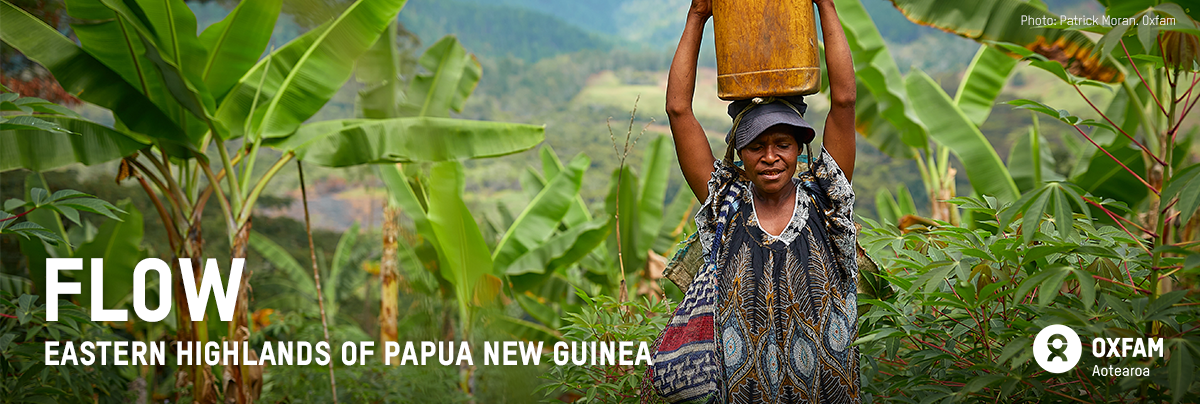
FLOW is our four-year project based in the rural Henganofi district in the Eastern Highlands of Papua New Guinea (PNG). FLOW stands for Fostering Lasting Opportunities in WaSH and WaSH stands for Water, Sanitation, and Hygiene.
Our goal is to improve health, resilience, and quality of life for remote and vulnerable communities, particularly women and children, in rural PNG.
In addition to constructing water and sanitation systems, like gravity-fed water tanks and private latrines, FLOW also focuses on education. Training initiatives include improving understanding around menstruation and hygiene, improving behaviours around open defecation and hand-washing, and making sure people know how to get existing government funding to improve and maintain their community’s water and sanitation systems.

KŌTUI
FLOW is part of our larger five-year, multi-country programme, Kōtui. Learn more about Kōtui here!
This te reo Māori word means binding together, or interlacing, during weaving. The woven mat represents dialogue and joint problem-solving in Pacific countries and in Timor-Leste. It is an appropriate symbol for a programme focused on inclusive and equitable governance.
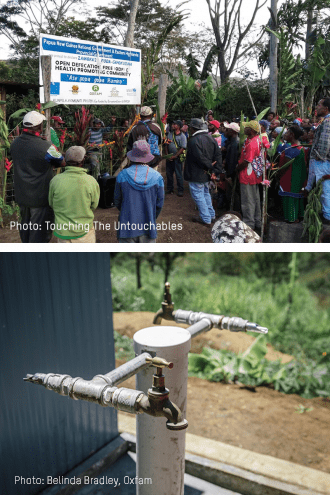
CHANGING BEHAVIOURS
Schools and communities are actively engaged, and more are becoming Open Defecation Free (ODF).
We have seen a huge change in knowledge, attitudes and behaviours as a result of training conducted! When we started the FLOW project two years ago, 85% of people in our 12 target communities in Henganofi were not using toilets. Following many conversations on the importance and benefits of hygiene and sanitation, this has reduced to 48%.
- Two of our target communities have now been certified as “Open Defecation Free” (ODF) – meaning residents have installed toilets and handwashing stations and are using them. Another five communities are ready for ODF certification, just awaiting formal assessment.
- Once a community has received its certification, Oxfam can begin to install toilets and water points in the confidence that they will be valued and used.
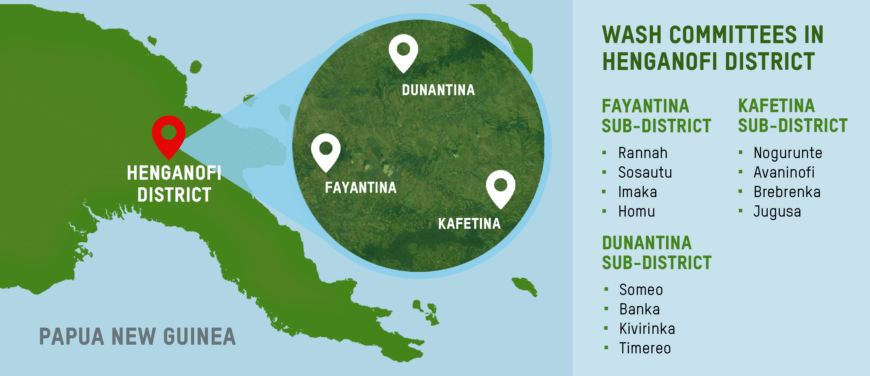
BUILDING WATER INFRASTRUCTURE
Oxfam has partnered with New Zealand-based engineering company Lautrec Technology Group Ltd to help plan the water infrastructure.
The Oxfam in PNG team prepared the engineering plans to suit the specific needs and requests of the various community sites where they will be installed, and Lautrec was able to make changes and improvements to the designs remotely. We are excited to have begun construction in these rural communities.
Our local construction partner in PNG will lead community trainings on WaSH facility maintenance. “If communities can construct it themselves, they will fix and maintain it themselves with an increased knowledge through construction.” – Oscar Tomati, Oxfam PNG.
Designs for gravity-fed water systems were finalised over the last few months, including a peer review from New Zealand-based engineering firm Lautrec Consulting Engineers. The materials for water systems in Imaka and Jugusa communities were recently purchased and delivered.
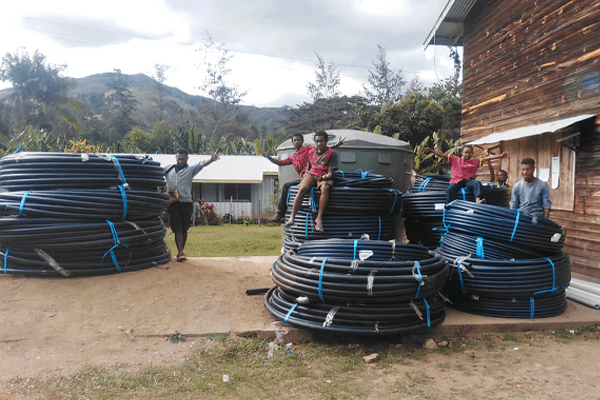
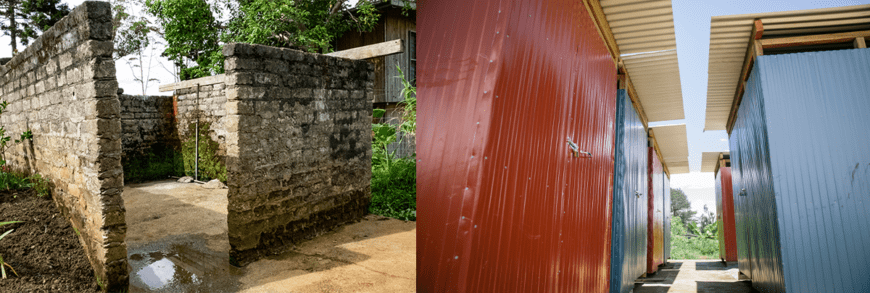
FLOW aims to improve schools’ hygiene facilities like the ones we see on the right. In December 2019, we visited schools where Oxfam has never worked before (left) and returned to ones where we have built hygiene facilities in the past (right). The goal is to build facilities that allow more privacy, especially for girls!
MENSTRUAL HYGIENE MANAGEMENT (MHM)
Many girls in PNG miss school each month because they cannot manage their periods at school without private toilets and running water. They fall further and further behind their classmates when they consistently miss their lessons.
Alongside our partner organisation, QueenPads, we are:
- Shifting unhelpful stigmas about menstruation
- Providing sanitation and menstrual hygiene education for teachers and students
- Building private toilets and handwashing stations.
With our partner, we have developed attendance monitoring forms, and teachers have explained to the girls the purpose of monitoring their attendance. Teachers’ feedback during school visits was positive. Girls were not embarrassed anymore. Schools are also supporting girls with their basic MH needs, resulting in most girls attending school even when they have their periods. Generally, all students, girls and boys, are now familiar with the topic of menstruation. The teachers are impressed with the girls’ improved attendance and proud of the boys’ changing attitudes and behaviours towards the girls. These schools have shown a big improvement within a short period of time. If sustained, these attitudinal and behavioural changes may have a long-lasting impact on girls’ education and life options.
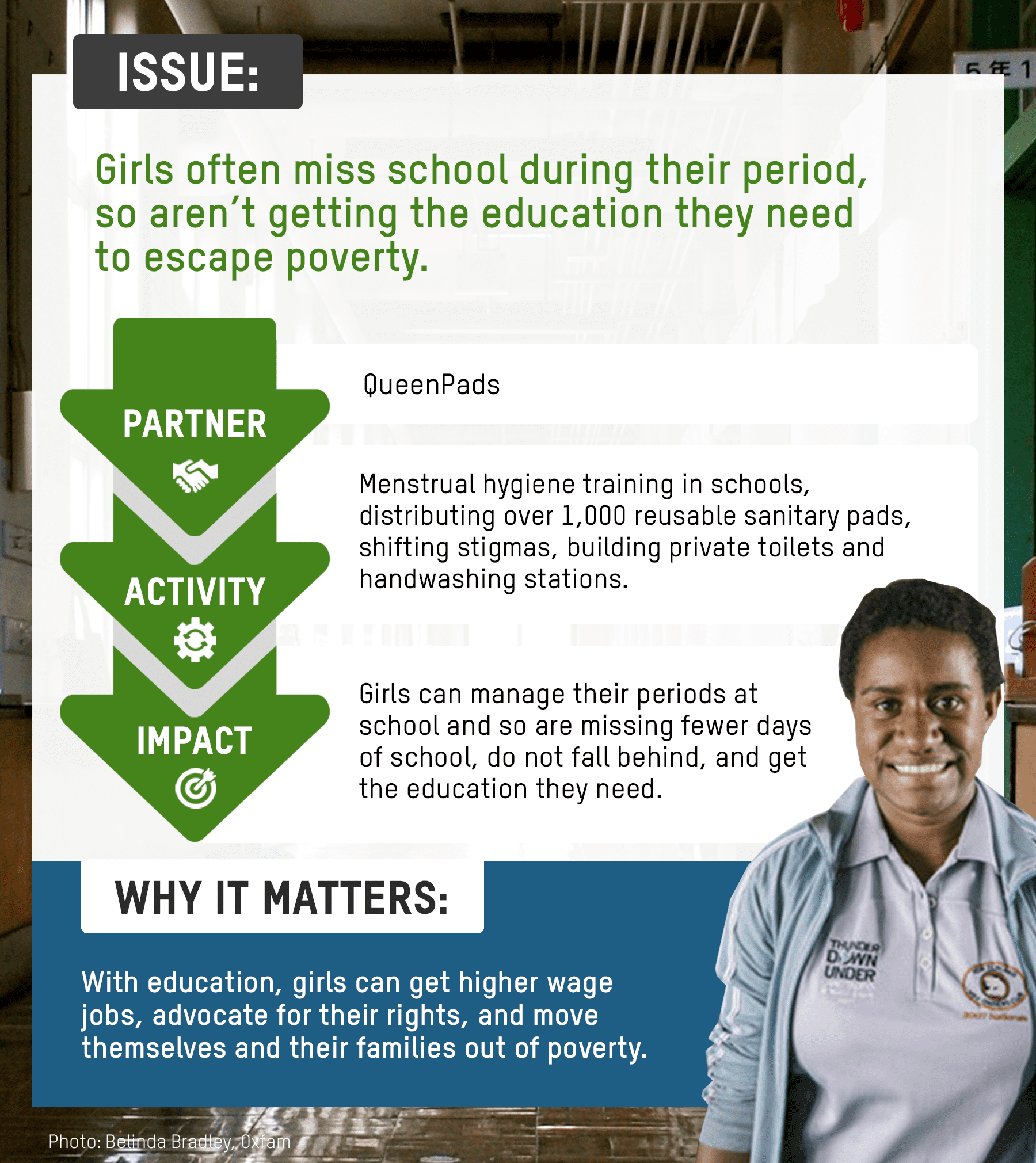

“Since 2019, I’ve been seeing changes with the attendance of girls. Usually, girls skip classes during their monthly period. Ever since the Oxfam FLOW team started visiting our school monitoring girls’ attendance and trainings on MHM, the girls started to change their ways. I have seen changes in their attitude and behaviour and would like to thank Oxfam for helping me help my students.”
Deputy Headmistress of Fayantina Primary School
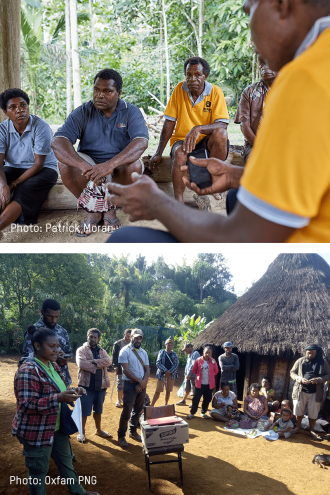
SYSTEMS CHANGE
We are making progress on transforming the underlying systems that have resulted in PNG’s poor health and water access.
One goal of FLOW is to increase women’s participation in community decision-making. More women are now participating in and leading community WaSH committees and have thus been able to drive the decisions that affect them, overcoming longstanding gender biases to prove the value of women in community decision-making. In fact, three women from the Jugusa WaSH committee spearheaded the necessary behaviour changes that led to their community earning its Open Defecation Free certification!
Our local partners report that in community meetings about what kind of water systems or toilets to build, diverse voices are being heard. People living with disabilities, women, and older people are all contributing. Community leaders are seeing that when women participate and give their views, it helps men to learn that women have important agendas to discuss.
“Many times, people misunderstand the concept of gender equality, however, it is not about creating competition or differences between the husband and wife. It’s about accepting each other’s roles and assisting each other or share responsibilities when necessary,” says Rubbie Mone Oxfam WASH Gender Officer during a gender awareness training (far left, in the lower image).
This systemic change has seen women taking leadership roles and driving the change necessary for their village to improve and get the toilets and water points they want. Another goal of FLOW is to increase understanding of the government’s responsibility to deliver and maintain water and sanitation, and help communities learn how best to access existing funding.
Members of PNG’s government are moving in the right direction, with one Member of Parliament allocating an additional budget of 200,000 kina, nearly $80,000 NZD, to address community requests for additional publicly accessible water points that were beyond the scope and budget of Oxfam’s FLOW project.
Oxfam PNG team members have also reported that their most important lesson learned has been how to interact with different levels of stakeholders, from provincial level to partners to community members – a key element to the success of collaborative working.
This systems change is a vote of confidence that helps illustrate that Oxfam and PNG’s government can work in partnership to build sustainable WaSH infrastructure for people in rural PNG.
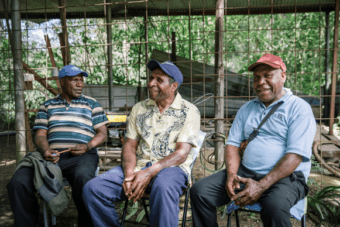
School Inspector George Leffy, Pastor Ken, and Norman Kassa, talk about water access challenges and their support for the work of TTU and FLOW, in a village in the Eastern Highlands District.
SUSTAINABILITY
One of the most important aspects of this project is to ensure that it sustains itself long after the project is complete. To make sure that communities have ownership of these initiatives and maintain the toilets, latrines, and water points, we have established community WaSH committees. The main function of the committee is to advocate for WaSH needs at the district level, with a particular focus on pushing for increased funding for WaSH service delivery in the district. Oxfam has established 8 committees (with a plan for 12 total) and signed several MoUs with communities and provincial health boards. This helps clarify who is responsible for the sustainability and maintenance of the water systems once they’re installed.
THE CONTINUING CHALLENGE OF COVID-19
Covid-19 is widespread throughout the Highlands of Papua New Guinea which has had intense impacts on our colleagues and partners. Every staff member has been fully vaccinated and returned to work. Oxfam Aotearoa is staying in close contact with our colleagues in PNG to see how we can continue to support them and the communities they work with, as they navigate their response to Covid-19. However, FLOW’s ongoing work to provide water, hygiene training and handwashing stations remains vital to help stop the spread of Covid-19 and other diseases into the long term.



